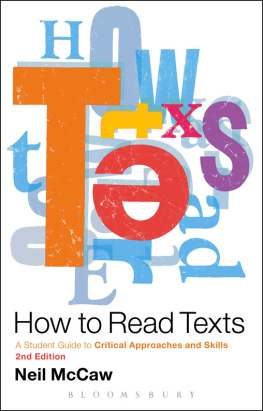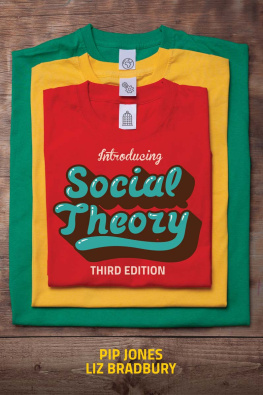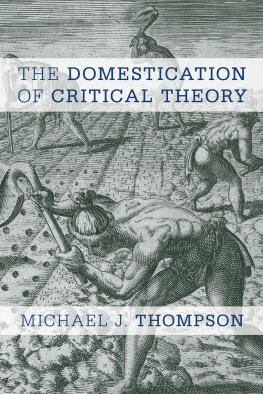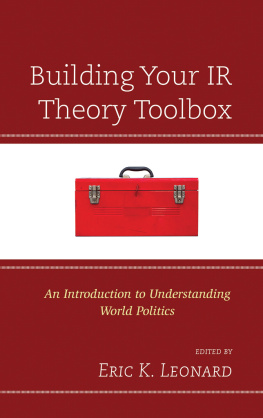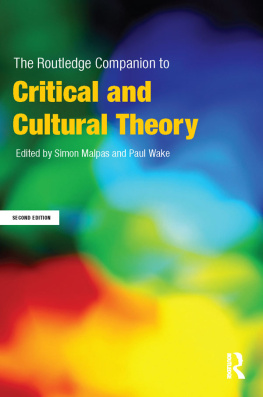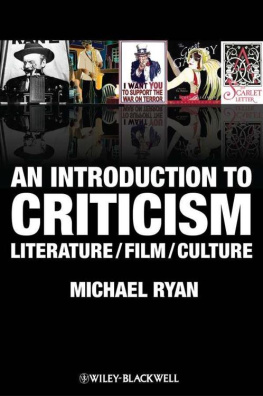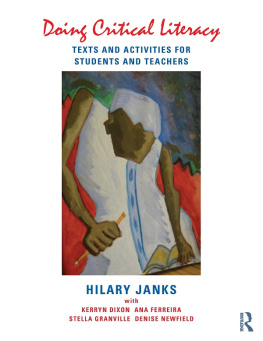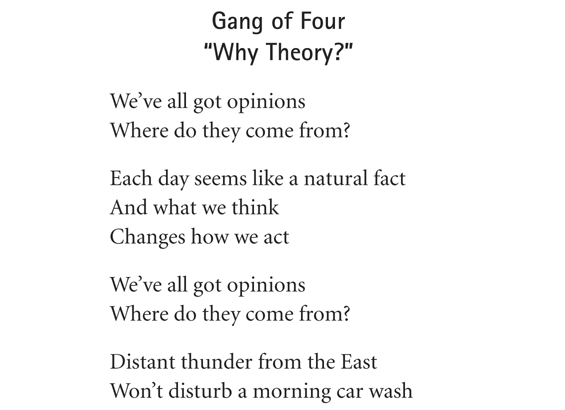About the Authors
JEFFREY NEALON teaches in the English Department at Penn State University. He is author of several theory books: DoubleReading: Postmodernism after Deconstruction (1993), Alterity Politics:Ethics and Performative Subjectivity (1998), and the coedited collection Rethinking the Frankfurt School: Alternative Legacies ofCultural Critique (2002).
SUSAN SEARLS GIROUX is associate professor of English and cultural studies at McMaster University in Hamilton, Ontario. She is the author of Between Race and Reason: Violence, IntellectualResponsibility, and the University to Come (2010) and the coauthor, with Henry A. Giroux, of Take Back Higher Education: Race, Youthand the Crisis of Democracy in the PostCivil Rights Era (2004). She has been managing editor of the interdisciplinary Review ofEducation, Pedagogy, and Cultural Studies for over a decade.
Acknowledgments
T his book has its roots firmly in the classroom specifically, in the introduction to theory course at Penn State. This book owes its largest debt to hundreds of Penn State undergraduateswho helped us to choose, debate, and refine everything in this book.
Weve also benefited immensely from discussions with other instructors whove used pilot versions of the text in their classes: Marco Abel, Debbie Hawhee, Jeff Karnicky, Dave Kress, Elizabeth Mazzolini, and John Muckelbauer. Susan Searls Giroux would like to thank her colleague, David L. Clark, for his rich insight regarding all things animal and two graduate students in particular for their unparalleled assistance with the second edition: Jennifer Fisher and Heather Berger. Ben Agger and Michael Greer offered crucial insight in their readings of the manuscript. Wed also like to thank Alison Sullenberger, Alden Perkins, Sallie Greenwood, and the late Alan McClare for their enormous efforts getting this text to publication.
Many thanks to Sarah Tanguy, curator of the Hechinger art collection, as well as to Phil Hetherington, webmaster of Not Great Men, and Andy Gill for their help with Gang of Fours Why Theory?
And weve gotten valuable advice, as well as invaluable encouragement, from Henry Giroux and Dean Birkenkamp.
CULTURE AND POLITICS SERIES
General Editor: Henry A. Giroux,
Pennsylvania State University
Postmodernitys Histories: The Past as Legacy and Project (2000)
Arif Dirlik
Collateral Damage: Corporatizing Public SchoolsA Threat toDemocracy (2000)
Kenneth J. Saltman
Public Spaces, Private Lives: Beyond the Culture of Cynicism (2001)
Henry A. Giroux
Beyond the Corporate University (2001)
Henry A. Giroux and Kostas Myrsiades, editors
From Art to Politics: Octavio Paz and the Pursuit of Freedom (2001)
Yvon Grenier
Antifeminism and Family Terrorism: A Critical Feminist Perspective (2001)
Rhonda Hammer
Welcome to Cyberschool: Education at the Crossroads in theInformation Age (2001)
David Trend
Surpassing the Spectacle: Global Transformations and the ChangingPolitics of Art (2002)
Carol Becker
Ethics, Institutions, and the Right to Philosophy (2002)
Jacques Derrida, translated, edited, and with commentary by Peter Pericles Trifonas
The Theory Toolbox: Critical Concepts for the Humanities, Arts, andSocial Sciences (2002)
Jeffrey Nealon and Susan Searls Giroux
Growing Up Postmodern (2002)
Ronald Strickland, editor
Why Theory?
Y ou can always count on a punk band to ask a good question: Why Theory? In our information-saturated cyberworld, it would seem that the last thing we need is more theorywhich tends to mean more talk, more abstraction. In fact, there seems to be no scarcity of theories floating around: theories about everything from who really bombed the World Trade Center, to the shadowy workings of the International Monetary Fund, to the sinister possibility of the United Nations sponsoring a secret One World Government. Theories abound, and in fact if theres a shortage of anything in the contemporary world, it seems to be of theorys opposite: action! Theories are all fine and good, but its finally what people do, rather than what they think, thats important. Actions, one might say, speak louder than theories.
And this seems to be the reason why, in almost any teaching and learning situation, theory has a bad name: Look out, here come the airy, hard-to-understand abstractions, with no concrete examples to back them up or illustrate them. In its very definition, theory seems neatly divorced from commonsense practice, and thats what makes it so frustrating to study: Theory seems separated from what people do.
But if thats the case, we come back again to the conundrum, Why Theory? Why bother with it? Well, one might begin to address this question by asking what it costs us to avoid theory. If you gain an important emphasis on action, what (if anything) do you lose when you dont ask the question of theory? Is theory itself the name for a crucial social action? What kind of practice is theory? What does theory do?
Turning back to the Gang of Four song with these questions in mind, we see them immediately translating the question that is the songs titleWhy Theory?into another question, the songs first lines: Weve all got opinions/Where do they come from? Weve all got opinions; thats easy enough to understand as an emphasis on the everyday, on the active exchange of social discourse. But the song seems immediately to want to shift ground again, away from the simple fact that everyone has opinions, to what one might call a question about theory: Where do they come from? What, we might ask, is gained or lost in such a change of emphasisfrom the social fact that all of us have opinions to the theoretical question of where these opinions come from? And how is this change of terrain related to the songs following stanza: Each day seems like a natural fact/And what we think/Changes how we act?
Oddly, it seems that for opinions to be at all productive, we are obliged to ask the question Where do they come from? If youve ever been in an argument with someone who simply states and restates his or her opinion about somethingwith no reasons to back it up, and no reflexivity on other potential points of viewyou can quickly see how the pragmatic social fact that Weve all got opinions isnt very productive. Unless we can ask theoretical questions larger questions about the origins of knowledges, who holds them, and how such knowledges were formed and might be changed were stuck in a go-nowhere exchange of opinions: he said, she said. This is, perhaps, where theory does something, where it becomes productive or useful for asking reflexive questions about how things work and how they might work differently. Even people who vehemently deny or disparage theories nevertheless traffic in them all the time. Theory and action are not as neatly opposed as they might appear at first glance.


